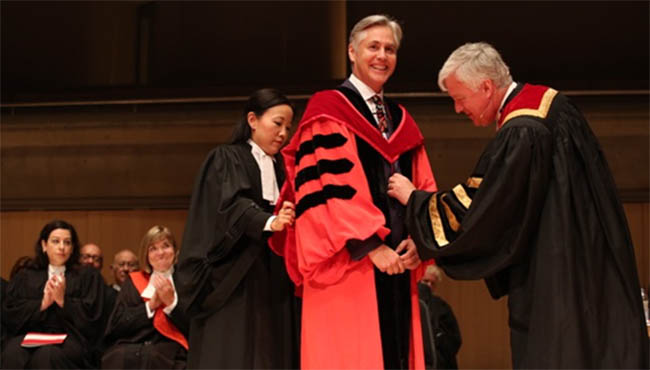Honourary Doctor of Laws recipient credits pre-contact Indigenous law

By Rick Garrick
Chippewas of the Nawash’s John Borrows credits his work on Indigenous laws that existed before contact for the honorary Doctor of Laws degree he received from the Law Society of Upper Canada on June 27.
“I’m trying to encourage people to understand that Indigenous laws exist in Canada and pointing out all the different ways that people can recognize and affirm it and strengthen it,” says Borrows, a professor and Canada Research Chair in Indigenous Law at the University of Victoria Law School. “There are two points — one is the law that was here before contact, and I talk about the different sources of that law. And the second (point) is how that law can be practiced and used in the present.”
Borrows was conferred with the Doctor of Laws degree by Law Society Treasurer Paul Schabas during the Call to the Bar ceremonies at Roy Thomson Hall in Toronto. His work has shaped the recommendations of both the Truth and Reconciliation Commission of Canada and the Royal Commission on Aboriginal peoples. His research and writing has also been cited by the Supreme Court of Canada.
“It was exciting,” Borrows says. “It was in Roy Thomson Hall so there were thousands of people and I was able to give a talk about the treaties and how they are for as long as the grass grows, the river flows and the sun shines.”
Borrows says there are five sources of Indigenous laws, including sacred stories; understanding the environment; talking or deliberating with one another; rules, sayings and chronicles; and customs and patterns of behaviour.
“So you see with these different sources of law that we have lots of opportunities, a big menu of possibilities, that we can take and use as we are trying to get through the challenges we are facing in the present,” Borrows says. “And of course these sources of law interact with one another too, so someone might have a custom but then they might start to deliberate about it, talk about it, and when they talk about it they might say: ‘Let’s create a rule,’ so they have a do or a don’t. And maybe that works for a while but eventually they feel like they need to refine it a bit so they go to the sacred story or they look at what is happening in the world around them.”
Borrows, who began teaching law in 1992, says his past students are practicing various occupations across the country.
“Some of them just go back to their community and assume roles in that way, some of them get called to the bar and then they help to influence the law in that way, and then some of them are teachers themselves now in colleges and high schools and universities,” Borrows says.
Borrows says the highlights of his career are about working with students and communities.
“They are just so bright and engaging and they always challenge you in good ways to make sure that you are thinking through what you are talking about, because they are going to ask the obvious and the challenging questions, and I really love that,” Borrows says. “I also quite enjoy working with communities, so I’ve had time teaching up in Iqaluit. I’ve worked in New Zealand and Australia with the Maori and the Aboriginal peoples down there. I’ve worked with Elders in Saskatchewan on the understanding of treaties.”
George R. Strathy, Chief Justice of Ontario, also received an honorary Doctor of Laws degree during the Law Society’s Call to the Bar ceremonies.


